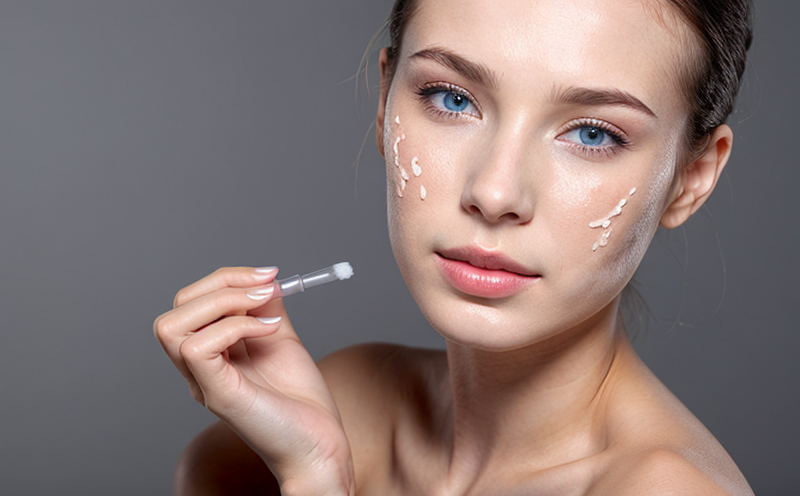Sensitization Testing of Cosmetic Alcohol-Based Products
Understanding sensitization in cosmetic products is crucial to ensure the safety and effectiveness of these products. Sensitization testing specifically targets the potential for a cosmetic product, including alcohol-based ones, to cause an allergic reaction or irritation when used by consumers. This service examines the irritant and allergenic properties of alcohol-based cosmetic products, ensuring they are safe for consumer use.
Alcohol-based cosmetics are common in skincare and hair care products due to their antimicrobial properties and ability to dissolve other ingredients effectively. However, certain alcohols can also cause skin irritation or sensitization if not properly tested and formulated. This service provides a detailed analysis of the potential allergenicity and irritancy of these products.
The testing process involves exposing human or animal subjects to the cosmetic product for a specified period under controlled conditions. The response is then monitored for signs of allergic reactions, such as redness, swelling, itching, or hives. For alcohol-based products specifically, this includes assessing the impact on the skin barrier and the potential for contact dermatitis.
Alcohol-based cosmetics can include various types of alcohols like ethanol, isopropyl alcohol, and others. The testing process must account for these variations to ensure comprehensive coverage. This service ensures that each type of alcohol in the product is evaluated for its sensitizing properties.
The results from this testing are critical for cosmetic manufacturers as they provide data on the potential risks associated with their products. This information can be used to modify formulations, change ingredients, or add additional stabilizers and preservatives if necessary. The ultimate goal is to produce safe and effective products that comply with regulatory requirements.
The sensitization testing service aligns with global regulations such as those set by the European Union's Cosmetics Regulation (EC 1272/2006) which requires manufacturers to test for allergens and irritants. This testing is also crucial in supporting the safety of alcohol-based products used in various sectors, including pharmaceuticals and personal care.
By adhering to international standards like ISO 10993-18:2017, this service ensures that the testing methodology is both reliable and reproducible. This helps manufacturers meet regulatory requirements while also gaining a competitive edge by demonstrating their commitment to product safety.
In summary, sensitization testing of cosmetic alcohol-based products is essential for ensuring product safety and compliance with global regulations. It provides critical insights into the potential allergenicity and irritancy of these products, allowing manufacturers to make informed decisions about formulation changes and ingredient selection.
Applied Standards
| Standard | Description |
|---|---|
| ISO 10993-18:2017 | Biocompatibility evaluation of medical devices. This includes assessing the potential for sensitization in contact materials. |
| IEC/TR 62764-3:2015 | Evaluation of biocompatibility and skin irritation of chemical substances used in cosmetics. This standard is crucial for alcohol-based products as it covers the evaluation of potential allergens and irritants. |
| ASTM E 527-18 | Standard practice for preparing specimens from commercial articles to test biocompatibility. This ensures that samples are representative of the final product. |
Quality and Reliability Assurance
- Use of standardized testing protocols to ensure consistent results.
- Inclusion of multiple test runs for each sample to verify reliability.
- Compliance with international standards such as ISO 10993-18:2017 and IEC/TR 62764-3:2015.
The quality and reliability of the testing process are paramount in ensuring accurate results. Our laboratory employs rigorous protocols that follow international standards to ensure consistent outcomes. Multiple test runs for each sample further validate the reliability and accuracy of our findings. This commitment to quality ensures that manufacturers can trust the data provided by this service.
Competitive Advantage and Market Impact
- Demonstrates a commitment to product safety, which is increasingly important in today's market.
- Enables early identification of potential issues, allowing for timely corrective actions.
- Supports compliance with global regulations, enhancing the reputation of manufacturers.
The results from this testing service provide significant competitive advantages and market impacts. By demonstrating a commitment to product safety, manufacturers can build trust with consumers and regulatory bodies alike. Early identification of potential issues allows for timely corrective actions, reducing the risk of recalls and legal challenges. Compliance with global regulations enhances the reputation of manufacturers in both domestic and international markets.





